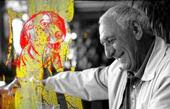October 06, 2005
BLOG MUST GO ON . . .
LE MOT ET LE RESTE is my other publisher in France who does my poetry and my essays
a collection of essays called Surfiction will be out in france in march
blog must go on
thanks
moinous
here's a great book about cynics and I am in it as the happy cynic of our time
Cynicism from Diogenes to Dilbert by Ian Cutler is published by McFarland
[Note: The following was written by Ian Cutler....]
For its detractors cynicism is a social toxin, a pathology of our time that shoots down every trace of noble idealism. In its positive sense, cynicism is a strategy used by smart people to see to it that they are not taken for suckers. Using Diogenes of Sinope as an exemplar of cynical reason, this book presents alternative cynical portraits of such disparate characters as Machiavelli, Nietzsche (characterized both as a modern Cynic and as a proto-postmodernist -- that pale version of Nietzsche's cynicism), the Dadaists (Diogenes was the original performance artist), George Bataille, Samuel Beckett, Auberon Waugh, South Park and others, to illustrate the many and varied faces of the cynic phenomena. The Afterword is presented as a tribute to Raymond Federman whom the author only stumbled across as the book was in its final stages. In his Herculean collection of writing Federman had amazingly already paralleled every theme covered by the seven chapters of this book.
By holding up the mirror of ridicule to human arrogance and stupidity, the Cynics saw it as their business to warn the rest of humanity about its own moral bankruptcy and from elevating itself too far above the muck to which we must all inevitably return. Federman's quotation above suggests that the cynic is motivated by kindness, even if the message is delivered in the style of a barking dog, yet Cynics have a poor track record for public relations as is testified by Julian's impression of Diogenes: one or two, indeed, used to applaud him in his own day, but more that ten times ten thousand had their stomachs turned by nausea and loathing.
But when Diogenes pisses, farts, defecates and masturbates in public, he is not merely clowning. In contrast to the formal lectures of Plato or Aristotle he is engaging in a form of high rhetoric that challenges the artificial conventions represented by these same philosophers. Cynicism requires a strong stomach as abjection is the cynics' natural environment and living close to defilement is a deliberate strategy to prevent the cynic from being cast down. Federman has succeeded in reversing this strategy -- rising from the manure to the golf course. His own insurance from being cast down (and that of all true cynics) is to ridicule himself, thereby denying others the chance.
While other books on the subject have either treated cynicism in its negative context as disparaging and sardonic, or have sought to contrast classical Cynicism with its modern forms, this book claims that aspects of Greek Cynicism are alive and well today, offering a positive strategy for living in a hostile world. The timeless relevance of Cynicism is summed up in Nietzsche¹s characterization as a cynic: his objection to scientific and religious dogmatism, his rejection of theoretical systems, his contempt for pretentiousness and narrow provincialism, his hostility towards social institutions, his antipathy towards pre-existing truths, his belief in cycles of return rather than progressive enlightenment to explain human history, and, significantly, his political incorrectness.
Ultimately cynicism is no more than an irksome reminder of our own human vulnerabilities and cock-ups, and when packaged as humor, a series of welcome interludes away from the mundane reality that is our daily lives. On an individual level, cynicism is a safety-valve, a survival mechanism to protect our individual integrity from being swallowed up by the corporate monster that seeks make us its obedient servant. We need a few celebrated cynics like a Diogenes or a Federman to inspire us to maintain our sanity in the presence of such tyrannical forces. And be in no doubt, if Diogenes had not been a celebrity Alexander would have had no reason to try and cast Diogenes in his shadow. In contrast, Dilbert is a very insignificant cynic. He represents the rest of humanity making their own little whimper of protest from inside their workplace cubicles. As Scott Adams, author of the Dilbert cartoons, tells us, workers pin up his comic strips on the office wall because murdering the boss is not an option.
Ian Cutler, Cardiff, Wales -- 8th October 2005
a collection of essays called Surfiction will be out in france in march
blog must go on
thanks
moinous
here's a great book about cynics and I am in it as the happy cynic of our time
Cynicism from Diogenes to Dilbert by Ian Cutler is published by McFarland
true cynics are often the kindest people, for they see the hollowness of life, and from the realization of that hollowness is generated a kind of cosmic pity.
Raymond Federman
[Note: The following was written by Ian Cutler....]
For its detractors cynicism is a social toxin, a pathology of our time that shoots down every trace of noble idealism. In its positive sense, cynicism is a strategy used by smart people to see to it that they are not taken for suckers. Using Diogenes of Sinope as an exemplar of cynical reason, this book presents alternative cynical portraits of such disparate characters as Machiavelli, Nietzsche (characterized both as a modern Cynic and as a proto-postmodernist -- that pale version of Nietzsche's cynicism), the Dadaists (Diogenes was the original performance artist), George Bataille, Samuel Beckett, Auberon Waugh, South Park and others, to illustrate the many and varied faces of the cynic phenomena. The Afterword is presented as a tribute to Raymond Federman whom the author only stumbled across as the book was in its final stages. In his Herculean collection of writing Federman had amazingly already paralleled every theme covered by the seven chapters of this book.
By holding up the mirror of ridicule to human arrogance and stupidity, the Cynics saw it as their business to warn the rest of humanity about its own moral bankruptcy and from elevating itself too far above the muck to which we must all inevitably return. Federman's quotation above suggests that the cynic is motivated by kindness, even if the message is delivered in the style of a barking dog, yet Cynics have a poor track record for public relations as is testified by Julian's impression of Diogenes: one or two, indeed, used to applaud him in his own day, but more that ten times ten thousand had their stomachs turned by nausea and loathing.
But when Diogenes pisses, farts, defecates and masturbates in public, he is not merely clowning. In contrast to the formal lectures of Plato or Aristotle he is engaging in a form of high rhetoric that challenges the artificial conventions represented by these same philosophers. Cynicism requires a strong stomach as abjection is the cynics' natural environment and living close to defilement is a deliberate strategy to prevent the cynic from being cast down. Federman has succeeded in reversing this strategy -- rising from the manure to the golf course. His own insurance from being cast down (and that of all true cynics) is to ridicule himself, thereby denying others the chance.
While other books on the subject have either treated cynicism in its negative context as disparaging and sardonic, or have sought to contrast classical Cynicism with its modern forms, this book claims that aspects of Greek Cynicism are alive and well today, offering a positive strategy for living in a hostile world. The timeless relevance of Cynicism is summed up in Nietzsche¹s characterization as a cynic: his objection to scientific and religious dogmatism, his rejection of theoretical systems, his contempt for pretentiousness and narrow provincialism, his hostility towards social institutions, his antipathy towards pre-existing truths, his belief in cycles of return rather than progressive enlightenment to explain human history, and, significantly, his political incorrectness.
Ultimately cynicism is no more than an irksome reminder of our own human vulnerabilities and cock-ups, and when packaged as humor, a series of welcome interludes away from the mundane reality that is our daily lives. On an individual level, cynicism is a safety-valve, a survival mechanism to protect our individual integrity from being swallowed up by the corporate monster that seeks make us its obedient servant. We need a few celebrated cynics like a Diogenes or a Federman to inspire us to maintain our sanity in the presence of such tyrannical forces. And be in no doubt, if Diogenes had not been a celebrity Alexander would have had no reason to try and cast Diogenes in his shadow. In contrast, Dilbert is a very insignificant cynic. He represents the rest of humanity making their own little whimper of protest from inside their workplace cubicles. As Scott Adams, author of the Dilbert cartoons, tells us, workers pin up his comic strips on the office wall because murdering the boss is not an option.
Ian Cutler, Cardiff, Wales -- 8th October 2005

